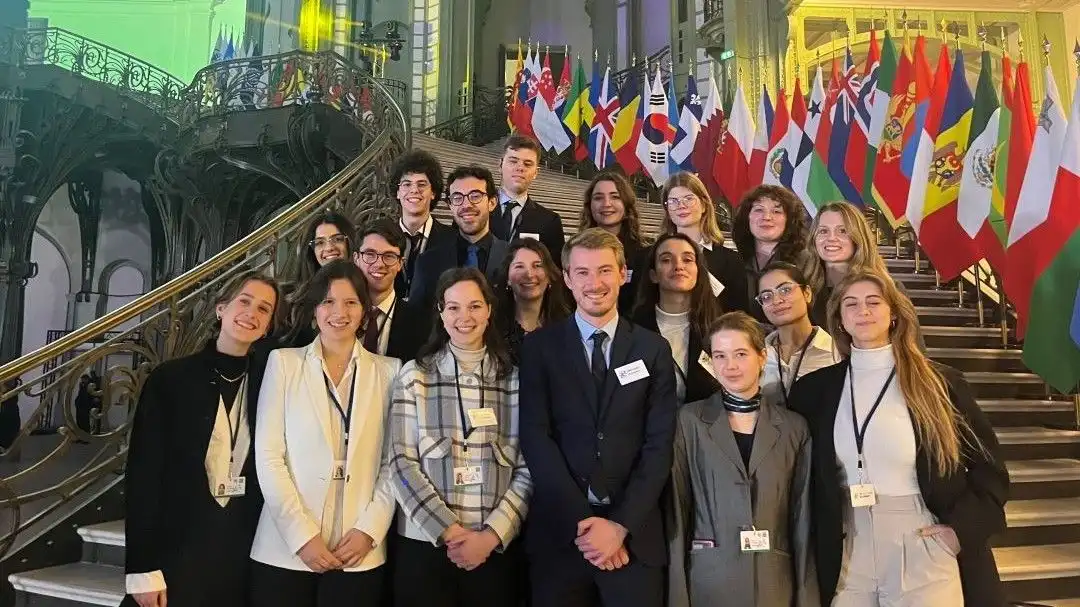Home>Inside the AI Action Summit: Student Volunteers from Sciences Po Share Their Experience
22.04.2025
Inside the AI Action Summit: Student Volunteers from Sciences Po Share Their Experience

Last February, Paris hosted the global AI Action Summit. 26 students enrolled in the Digital, New Technology and Public Policy Policy stream at the Sciences Po School of Public Affairs volunteered to help make this major international event a success. In this article, three of them reflect on their experience and how it resonates with their academic journey and future ambitions.
What motivated you to volunteer at the AI Action Summit, and how did the experience align with your academic journey in the Digital and public policy stream ?
Janina Morstin : My motivation for volunteering and studying at Sciences Po were one and the same: gaining real-world experience, alongside real experts, concerning real and pressing issues in the tech-related field. Academically, I focus on cybersecurity as well as comparative data protection law between the EU and U.S. Sciences Po emphasizes translating theory into practice and the customizable nature of the curriculum also extends to extracurricular opportunities, like this summit.
Shuyu Cao : As a Chinese student, I have a strong interest in the intersection of technological innovation and governance. Volunteering at the AI Action Summit was a natural extension of my academic journey—it offered a rare opportunity to observe how the topics we study in class, such as AI regulation, digital ethics, and global governance, are applied in real-world policy discussions.
As a student with an interdisciplinary and international background, how did you perceive the conversations between tech leaders, policymakers, and civil society at the summit?
Julien Vitry : As I am currently studying IT at School 42 alongside my master's degree, I perceived the conversations at the summit as a complementary mechanism. On one hand, tech leaders brought valuable technical insights, showcasing the feasibility of their projects and how they align with their vision to reshape the tech landscape. On the other hand, the exchanges with policymakers and civil society highlighted crucial considerations beyond the technical realm, offering a broader understanding of AI’s societal impact and how related policies may evolve.
Shuyu Cao : For me, the summit revealed how interdisciplinary and international collaboration is not just valuable, but necessary. Each group spoke a different “language,” but the attempt to build bridges between them reminded me of the importance of translation—not just linguistically, but conceptually—when shaping global tech governance. It was also encouraging to see that student voices and youth engagement were taken seriously in such dialogues.
What insights did you gain from working behind the scenes of such a large-scale international event?
Janina Morstin : Beyond academics, the event was a fantastic space to meet industry specialists who share my research interests—some of whom offered insights and feedback on my current work on digital deliberation tools and AI’s role in governance. Finally, organizing a high-level event offered an understanding of large-scale event management. The level of responsibility and the trust placed in me were powerful confidence boosters and allowed me to add a meaningful addition to my professional portfolio.
Shuyu Cao : Working behind the scenes taught me how much effort and coordination go into making an event like this successful. One key takeaway was that impactful policy dialogue relies as much on efficient logistics as it does on good ideas! I also had the chance to observe how diplomatic etiquette plays a role in multi stakeholder events—everything from who speaks when, to how questions are framed, can influence the tone and direction of the conversation. These are insights I couldn’t have gained in a classroom alone.
From a student’s perspective, what do you think can be expected from a global summit on AI like this one, both in terms of impact and inspiration?
Julien Vitry : From my perspective, a global summit on AI like this one should center around a key principle: the desire to collaborate and collectively build a better future for these technologies. The true value of such an event lies in the exchange of visions and perspectives from diverse professional spheres—which may sometimes have conflicting priorities or approaches. However, rather than seeing these differences as obstacles, they should be embraced as opportunities for constructive dialogue and mutual learning. This kind of meaningful exchange is only possible when built on a foundation of trust, mutual respect, and shared optimism. A summit like this offers the perfect environment to foster those connections by bringing together individuals united by a common goal: advancing AI in a responsible and inclusive way.
Shuyu Cao : In terms of inspiration, the summit demonstrated to me—and other young attendees—that we can be part of these important conversations. It encouraged me to continue building the skills, knowledge, and networks necessary to one day contribute more actively to the governance of emerging technologies. Most of all, it reminded me that public policy is not abstract—it is something alive, evolving, and open to new voices!
Janina Morstin, Shuyu Cao, Julien Vitry.
Information Sessions: Masters

Find out more about the Masters programs and the wide choice of specialisations offered by the 8 Schools of Sciences Po during our webinars dedicated to applicants.